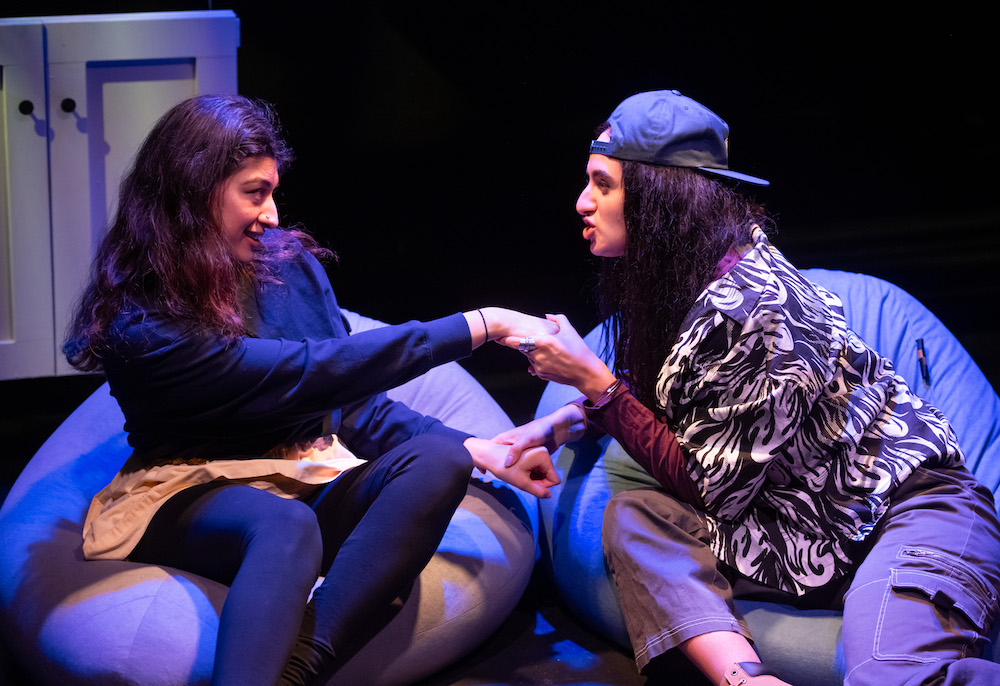Young playwrights often need — and deserve — more help than they get.
In playwright Lee Nisar’s Dil Ka, a 26-year-old Pakistani-Canadian woman named Zahra is preparing biryani for a proposal meeting, which means that she’s about to feed a potential groom and his family — and be judged, in part, on the quality of her cooking. As Zahra toils, her loving, kooky family members come and go, and Zahra shows us flashbacks — of the devout Muslim faith that took root when she was little, and of her best friend Jaz, with whom, it soon becomes clear, Zahra is smitten.
There’s poetry in Nisar’s writing. Describing what it was like to be in the vast space of her mosque as a kid, moving in unison with the other congregants, Zahra says, “It made me feel big and small at the same time.” When Zahra and Jaz are teenagers, Jaz, who is chafing at the restraints of traditional Pakistani culture, says it feels “like your skin is shrinking on you.” And there’s physical poetry — and all sorts of resonance — in a scene, set in the same time period, in which Zahra shaves Jaz’s long hair down to a buzz cut.
Nisar uses comedy, too, sometimes effectively. In this production, the script’s comic potential is best realized in actor Nimet Kanji’s characterization of Mama. Mama is a classic overbearing mother, who can’t resist “correcting” Zahra’s biryani and whose proclivity for wild statements was clearly recognized by the heavily Pakistani audience on opening night. Trying to talk Zahra out of her desire to travel before marrying, Mama says, “Where is the world going? Nowhere!” So there’s no big rush to travel.
Other comic elements — notably the farcical ones — are less successful. There’s an extended scene, for instance, in which Baba (Zahra’s dad) tries to sneak a taste of her biryani, while Mama repeatedly grabs a series of spoons from his hand. This bit is never funny, but it just keeps going. Other scenes based in broad physical comedy also fall flat.
But by far the biggest problem is that, in its two-hour running time, Dil Ka is very, very repetitive. As I said, it’s clear early on that Zahra is lesbian and into Jaz, but it takes for-bloody-ever for the script to overtly acknowledge any of this. For almost the entire first act, Zahra dithers, seemingly unable to name her dilemma, although I’m sure pretty much anybody watching Dil Ka could help her out with that. And then, after Zahra has finally acknowledged her attraction to Jaz, playwright Nisar tacks on narratively redundant scenes, one in which Zahra helps her little sister Sania with make-up, and one about Zahra’s early crush on a Bollywood movie star.
Clearly, the whole play is leading up to Zahra’s coming out to her family — and the primary narrative tension arises from our anticipation of their reactions. But, in the very short second act, Nizar’s script only takes us to the brink of Zahra’s revelation — and leaves us hanging. There’s no payoff. It feels like a cop-out.
You could argue, of course, that, in Dil Ka, Nisar is engaging in a less plot-driven, more thematically meditative form of storytelling. But theatre unfolds in time and, one way or another, that journey through time has to be more substantially rewarded than it is in Dil Ka.
This is where the producers of Dil Ka should have helped Nisar out. Somebody with an understanding of structure needed to step in with suggestions for substantial cuts and further development.
Fortunately, the performances in this production all have their own charms.
As Zahra, Talia Vandenbrink brings a consistent level of openness to the reams and reams and reams of text that it falls on her to deliver — and that openness does significant service in helping to buoy the evening. That said, director Tricia Trinh could have helped Vandenbrink find more variety. In the production’s current form, the actor spends far too much time in a generalized state of frenzy.
Tanaz Roudgar brings persuasive levels of stillness and authenticity to her performance as Jaz.
As I mentioned, Nimet Kanji is hilarious as Mama — and there’s more to her characterization. Kanji’s Mama is moving, for instance, in a speech about how vulnerable Zahra was when she was born prematurely: “Twenty-six years later, she seems smaller than ever.”
Parm Soor (Baba), Rami Kahlon (Aisha), and Janavi Chawla (another sister, Sania) all deliver broader characterizations and that’s mostly what the script seems to be calling for.
With its stacked planes of brightly coloured windows and doors, Kimira Reddy’s set design is visually pleasing and speaks to layers of memory. Mishelle Cutler’s sound design is subtly supportive. And director Trinh adds resonant action: as Zahra describes how hard Baba worked when the family first arrived in Canada, for instance, we see him walking up and down a set of stairs, as if on a treadmill.
In Urdu, “Dil Ka” means “of the heart”. There’s a lot of heart in this production. In terms of technique, that heart could be much more effectively presented.
DIL KA by Lee Nisar. Directed by Tricia Trinh. A Ruby Slippers Theatre production, co-presented by Blackout Arts Society and Presentation House Theatre. On Friday, March 22. At Presentation House Theatre until March 31. Tickets
PHOTO CREDIT: As teenagers, Zahra (Talia Vandenbrink, L) and Jaz (Tanaz Roudgar) experience the first blush of love.
NEVER MISS A REVIEW: Sign up for FRESH SHEET, my weekly e-letter about the arts.






0 Comments